Being your own boss can be incredibly rewarding. It comes with the freedom to make your own schedule, which poses the challenge of time management. So the best time management books for entrepreneurs are critical reads for content creators and entrepreneurs.
Any entrepreneur knows that a to-do list only gets longer the more successful you become. All the while, the number of hours in the day stays the same. So it makes sense that the most successful people are those who use their time wisely.
Entrepreneurs have to find the system that works for them, but these books on time management are a great starting point. They can also serve as a way for serial entrepreneurs to continue their journey of self-improvement. They each have something different to offer and include tips on organizing and maximizing your time. Plus, they’re available in audio form, so you can listen while you drive, work out, or run errands.
Best time management books for entrepreneurs

Tools of Titans: The Tactics, Routines, and Habits of Billionaires, Icons, and World-Class Performers by Timothy Ferris
“Schedule things in advance to prevent yourself from backing out… Make commitments in a high-energy state so that you can’t back out when you’re in a low-energy state.”
Timothy Ferris, an entrepreneur known for his involvement in TaskRabbit and Uber, based his Tools of Titans book on interviews with over 200 people for his podcast. He talked to a variety of people including Jamie Foxx and Special Operations military commanders. He focused on the details of people’s daily lives. Everything from what they do when they first wake up each morning, why they work out a certain way, and what they think is a waste of time.
But, he doesn’t just take their word for it. He tested their advice to make sure it worked in the real world before he put it into his book. Ferris credits what he learned with helping to make him millions of dollars. It also saved him years of frustration and potential wasted efforts.
One thing people love about Ferris’ book is that it not only focuses on what successful people do well, but also identifies weaknesses and how to overcome them.
{{todolist-component="/blog-shortcodes/blog-popup"}}
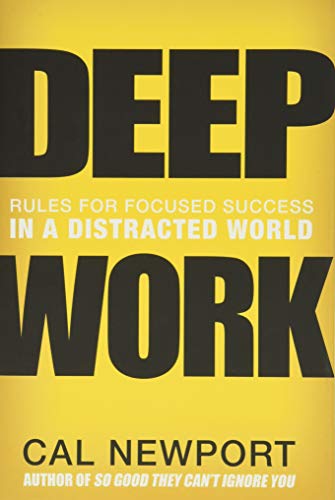
Deep Work: Rules for Focused Success in a Distracted World by Cal Newport
“Three to four hours a day, five days a week, of uninterrupted and carefully directed concentration, it turns out, can produce a lot of valuable output.”
Some time management books are focused on little changes that can make a big difference. Deep Work is the opposite of that. Cal Newport, a New York Times bestselling author, advocates for a complete lifestyle revamp. He argues this kind of change is increasingly rare–and increasingly valuable–in the modern world.
Life is broken up into two different categories: deep and shallow work. Shallow work doesn’t require a lot of brain power and can be done while multitasking. Deep work, however, improves a person’s skills by pushing someone’s cognitive capabilities.
Newport dedicates three to four hours of his day, five days a week, to uninterrupted and carefully directed concentration. That time is spent dedicated to improving a specific skill or mastering an idea. Thereby helping you improve in a shorter amount of time. Switching between tasks leads to lower-quality work. Newport argues that eventually, too much task-switching makes deep work increasingly difficult.
Of course, it isn’t possible to completely avoid shallow work. So, Newport dedicates some time each day to those tasks too.
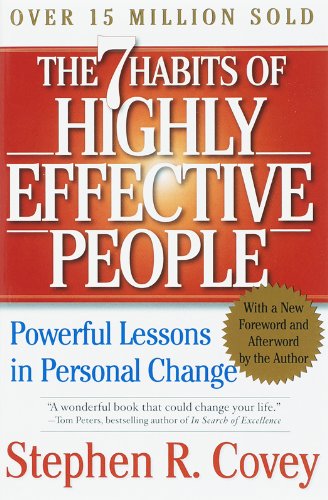
The 7 Habits of Highly Effective People: Powerful Lessons in Personal Change by Stephen R. Covey
“The key is not to prioritize what’s on your schedule, but to schedule your priorities.”
Stephen Covey’s book became an instant bestseller when he published it in 1988. While it may be over 30 years old, the tips are as relevant as ever. The principles have been used by CEOs, politicians, and athletes and are both focused on self-improvement and helping a person’s relationships with others.
Covey’s son, also named Stephen, credited the book’s success with its focus on principles that are universal and cross cultures, time, and countries, making it relevant to everyone.
Implementing these seven habits requires time management and Covey suggests making sure your actions follow five rules:
- They must be principle-centered.
- They must be conscience-directed, meaning that they give you the opportunity to organize your life in accordance with your core values.
- They define your key mission, which includes your values and long-term goals.
- They give balance to your life.
- They are organized weekly, with daily adaptations as needed.
By keeping these five guidelines in mind, you won’t waste your time on tasks or actions that don’t serve your goals or mission.
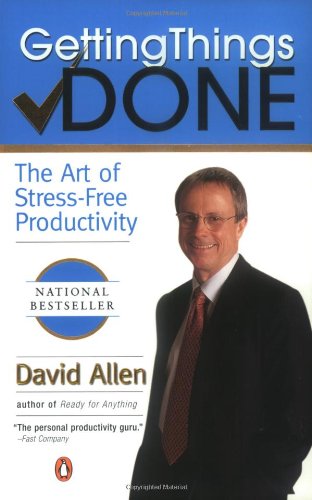
Getting Things Done: The Art of Stress-Free Productivity by David Allen
“Things rarely get stuck because of lack of time. They get stuck because the doing of them has not been defined.”
David Allen’s Getting Things Done is a time management method that aims to free up the mind. This then leaves room to focus on one task at a time. At the core of the strategy are written notes and clearly defined tasks. The goal is to reduce the noise that plagues life and can serve as a distraction.
Allen believes that most stress is due to inappropriately managing time and tasks. To be productive, a person has to use organized lists that differentiate between what needs to be “done” and how it gets done.
Instead of just listing out items on a to-do list, the description needs to include criteria of how a person will determine the task is complete and what steps are needed to complete the task.
Allen doesn’t stop at just one list though, he likes several lists running simultaneously. Along with a list of how to complete a task, successful people should have a list of the other items they need to get done. This helps free up mental space to focus on the task at hand without getting sidetracked by the other tasks that have to get done.
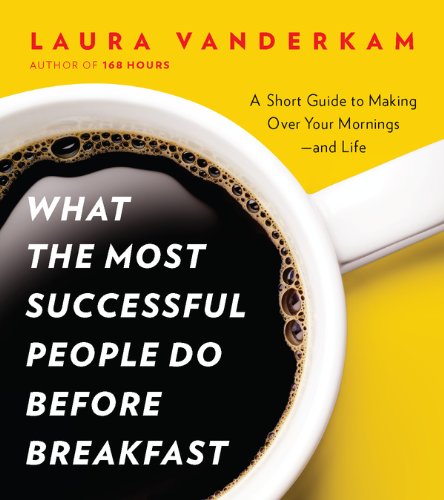
What the Most Successful People Do Before Breakfast by Laura Vanderkam
“Before the rest of the world is eating breakfast, the most successful people have already scored daily victories that are advancing them toward the lives they want.”
The cold, hard truth of being an entrepreneur is that getting up early is key to success. Sure, some people think they’re most productive at night, but Laura Vanderkam’s research offers a different narrative. Vanderkam’s study of successful people found mornings are when people have the most control over their time and the most energy and willpower to motivate themselves to accomplish their top priorities. Plus, getting things done in the morning allows a person time to focus their energy before the outside world places its own demands on them.
Broken down into four words: you own your time.
It takes a lot of self-discipline to spend mornings on important priorities instead of sleeping or relaxing in bed. But, Vanderkam found that after time, applying this method in the morning becomes a habit that is easy to apply to every aspect of life, leading to a more fulfilling and happy life.
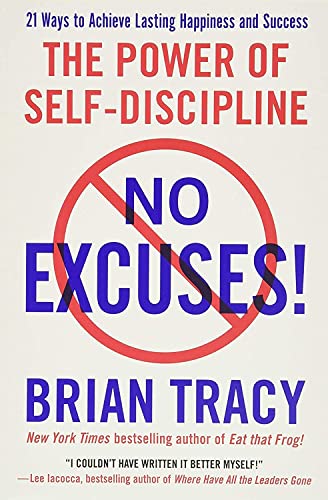
No Excuses!: The Power of Self-Discipline by Brian Tracy
“Self-discipline is the ability to do what you should do, when you should do it, whether you feel like it or not.”
Procrastination is a killer for entrepreneurs. It’s a waste of time and sucks up precious energy you could spend on building your business. It makes tasks drag on and by the time you’ve finished what you were doing, it’s probably not your best work. This is what makes self-discipline so important to success.
It may sound obvious that self-discipline is part of the recipe for success but if people could just wake up one day and be disciplined, everyone would do it. Thankfully, in Brian Tracy’s book No Excuses!, he not only discusses the importance of self-discipline but also gives entrepreneurs practical advice to master the art.
As the book’s name suggests, Brian teaches people how to use the motivation within themselves to do away with any excuse that can keep them from achieving their goals.

The Checklist Manifesto: How to Get Things Right by Atul Gawande
“Checklists seem able to defend anyone, even the experienced, against failure in many more tasks than we realized.”
One of the recurring themes in nearly every book on time management is using a checklist. It’s something you’re probably already doing. Nobody can possibly remember everything they have to do.
While Atul Gawande’s book starts out focused on his experience as a surgeon, his writing is made for people across every industry. He breaks errors down into two categories–errors of ignorance and errors of ineptitude. Most failures in the modern world are errors of ineptitude, meaning that we don’t make proper use of what we know. For doctors, this could be forgetting to ask a key question. For content creators, it could be forgetting to double-check your copy or doing a final look at a video before it’s made public.
Gawande argues that errors can be minimized with the use of checklists.
You may be thinking that a book about checklists is going to be dry or boring. But, Gawande uses fascinating stories and interviews with pilots and architects to drive home just how important written guides are in the modern world.
Tips for time management
Time management is an easy concept to understand and a really difficult one to master. But, it’s one of the most important things successful people do well, and following these tips can make it a little easier.
- Order your tasks based on importance, not feasibility. Case studies have shown that people tend to pick the easiest tasks to do first and then get into the harder tasks. While this can seem like you’re having a productive day, it’s also a form of procrastination. Yes, you’re checking things off your list, but you could also be avoiding the most important tasks you need to get done.
- Block off time for each task. One of the biggest wastes of time is jumping between tasks. It takes your brain time to adjust to every task. So, every time you switch tasks in the middle of doing something else, you’re wasting time.
- Identify your productive hours. Few people can be productive all the time the time when someone is most productive varies from person to person. It’s critical to find at what point in the day you do your best work and then prioritize important tasks for those times. Schedule less important tasks for other points of the day.
- Learn to say no. Even people who are excellent at time management only have so much time in their days. Overloading yourself with tasks–especially unimportant ones–will make managing your time significantly more difficult. It’ll add pressure to the tasks that you absolutely need to get done. So, sometimes the easiest way to manage your time is to make sure you have enough of it.
Join more than 150,000 creators who use Teachable to make a real impact and earn a real income.


